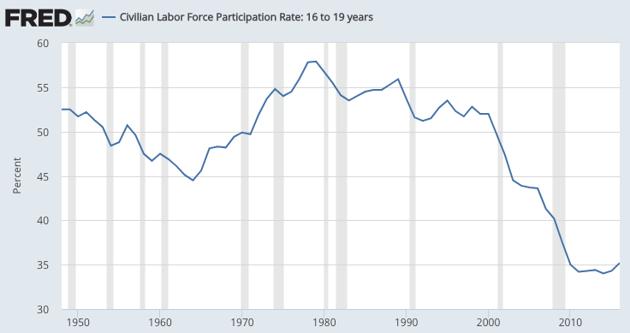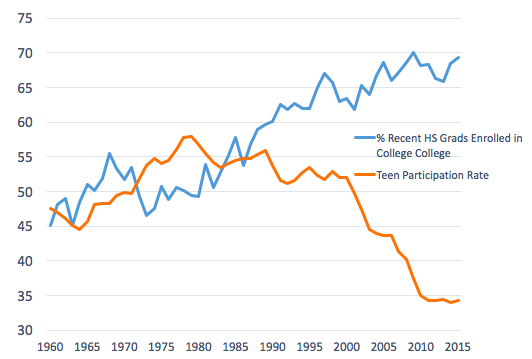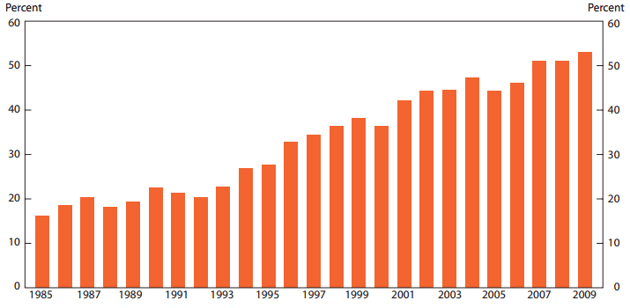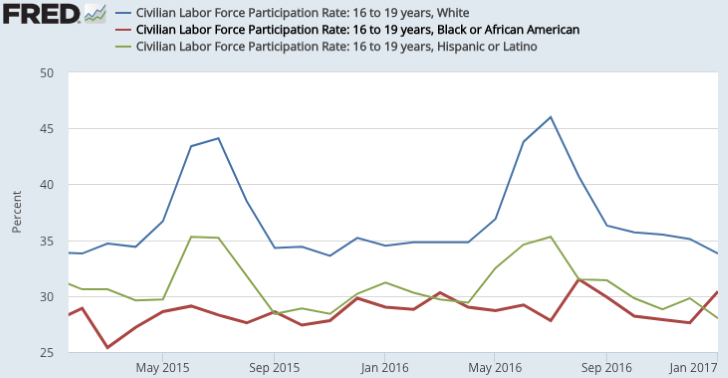Teenagers have stopped getting summer jobs – why?
Most used to work in July and August. Now the vast majority don’t. Are they being lazy, or strategic?
The summer job is considered a rite of passage for the American Teenager. It is a time when tossing newspaper bundles and bussing restaurant tables acts as a rehearsal for weightier adult responsibilities, like bundling investments and bussing dinner-party plates. But in the last few decades, the teenage summer job has been disappearing. In the summer of 1978, 60 percent of teens were working or looking for work. Last summer, just 35 percent were.
Why did American teens stop trying to get summer jobs? One typical answer is: They’re just kids, and kids are getting lazier.
But one can rule out that hypothesis pretty quickly. The number of teens in the workforce has collapsed since 2000, as the graph below shows. But the share of NEETs—young people who are “Neither in Education, Employment, or Training”—has been extraordinarily steady. In fact, it has not budged more than 0.1 percentage point since the late 1990s. Just 7 percent of Americans teens are NEETs, which is lower than France and about the same as the mean of all advanced economies in the OECD. The supposed laziness of American teenagers is unchanging and, literally, average.

A better answer is that teenagers aren’t spending more time on the couch, but rather spending more time in the classroom. Education is to blame, rather than indolence. Teens are remaining in high school longer, going to college more often, and taking more summer classes. The percent of recent high-school graduates enrolled in college—both two-year and four-year—has grown by 25 percentage points. That is almost exactly the decline in the teenage labor-force participation rate.
Teen Participation Rate vs. Share of New High School Graduates in College

With tougher high-school requirements and greater pressure to go to college, summer classes are the new summer job. The percent of 16-to-19-year-olds enrolled in summer school has tripled in the last 20 years, according to the Bureau of Labor Statistics. The rise in summer school may be directly related to the fact that parents and high schools are encouraging students to take on more classwork, according to Ben Steverman, a Bloomberg reporter who covers teen employment. He finds that the percentage of high-school grads completing at least four years of English, three years of science, math, and social science, and two years of foreign language has sextupled since the early 1980s.
Share of Teenagers Taking Summer Classes

The second reasons why teens work less today is that, for a variety of reasons, employers are more reluctant to hire them. First, the rise of low-skill immigration in the last few decades has created more competition for exactly the sort of jobs that teenagers used to do—like grocery-store cashiers, restaurant servers, and retail salespeople. Second, older Americans stay in the workforce longer than ever before, and many of them wind down their careers in the sort of jobs that used to be the province of 16-year-olds in the summer, like office secretaries.
Third, the number of federally funded summer jobs, where students take temporary jobs with their local government, has declined. At the same time, the the minimum wage has grown, which may have discouraged bosses from taking on young inexperienced workers who are only “worth” hiring at a salary that’s become illegal. Together, these policies have reduced the number of temporary paid jobs for teenagers in the public and private sector. Fourth, companies have caught on to the fact that if they want to hire teenagers, they don’t have to pay them, at all: There has been an extraordinary rise in unpaid internships over the last decade. Although these teenage interns are clearly working, they don’t count as workers in government statistics, because they’re not getting paid.
The third big-picture explanation for the demise of teen summer jobs is cultural. Teenagers are exquisitely sensitive to the social norms of their peers. If they see cool older teenagers scooping ice cream during their freshman summer, they’ll really look forward to a job scooping ice cream during their sophomore summer. But any social feedback loop can spin both ways. Recently, the cultural norm is shifting toward summer classes and unpaid internships rather than summer jobs. Since the mid-1990s, the share of teenagers who say they wish they were working has fallen by about 50 percent, according to the BLS. That suggests—although it cannot prove—that summer jobs have lost some of their social status, as the norm has shifted away from working.
Share of Non-Working Teens Who Say They Wish They Were Working

It’s important note out that it’s probably white adults who feel the strongest nostalgia for summer jobs. Here's a look at the teen participation rate for the last two full years for whites, hispanics, and blacks. Each July and August sees a 10-point jump in the number of white teenage workers; a 5-point jump in the number of hispanic teen workers; and hardly any movement among black teenagers. (There is evidence that Asian teens are more like white teens in this regard.)

Compare that with 1978 and 1979, the statistical peak of the teen summer job. In July and August in the late 1970s, 30 percent of white teens flooded into the labor force, along with 20 percent of hispanics. Again, black teen participation hardly budged.

Putting these two graphs together, two things are clear. First, the summer-job bump has declined for all ethnicities in the last 40 years. Second summer jobs are the province of the white and wealthy. Children of richer families are more likely to take part-time in summer jobs, according to a report from the Center for Labor Market Studies at Northeastern University. But black and low-income teens are less likely to work, not only because their neighborhoods have fewer opportunities, but also because their families have fewer connections to companies with internships and part-time jobs. Altogether, summer jobs may be yet another vector through which privilege becomes inherited from one generation to the next.
Is there any good reason to be nostalgic for teen summer jobs? Don’t they teach kids responsibility, “soft skills,” and a humbling tolerance for the tedium of office life? There are several studies that show summer jobs for teens pay a long-term dividend in higher earnings and reduced crime. But there are even more studies hailing the benefits of high-school completion and college attendance,and many teens have to choose between education and work. (It will be interesting to see if the summer job has a resurgence in the new low-unemployment economy.)
The mysterious disappearance of the summer job for teenagers turns out to be a perfect parable for the flexibility of the workforce. Many of the jobs that teenagers used to do no longer exist; they’ve gone to older Americans and new immigrants. But rather than use the fallow months to quintuple their video-game time, teenagers are taking the time to invest in their educational future. This is hardly the place to expend America’s finite national anxiety.
Congratulations @carl15ful! You have completed some achievement on Steemit and have been rewarded with new badge(s) :
Click on any badge to view your own Board of Honnor on SteemitBoard.
For more information about SteemitBoard, click here
If you no longer want to receive notifications, reply to this comment with the word
STOPBy upvoting this notification, you can help all Steemit users. Learn how here!